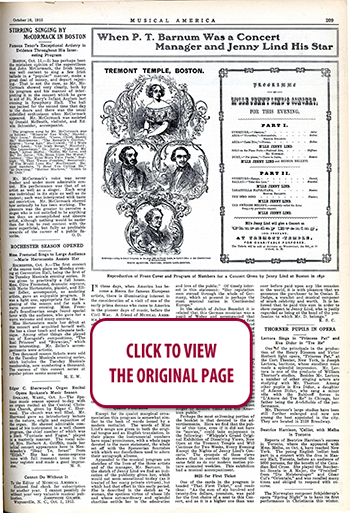 100 YEARS AGO...IN MUSICAL AMERICA (114)
100 YEARS AGO...IN MUSICAL AMERICA (114)
October 16, 1915
Page 209
When P. T. Barnum Was a Concert Manager and Jenny Lind His Star
IN these days, when America has become a Mecca for famous European artists, there is illuminating interest in the consideration of a visit of one of the early prima donnas who came to America in the pioneer days of music, before the Civil War. A friend of MUSICAL AMERICA has lately put at its disposal a copy of the program of a concert given by Jenny Lind in 1860, at Tremont Temple, Boston. Of this booklet the front cover and the page containing the evening’s program are reproduced herewith.
Shown on the front famous “Swedish Nightingale,” and below her the conductor, Julius Benedict, and the assisting baritone, Giovanni Belleti, while at the bottom is P. T. Barnum, the circus king, who was the impresario of the tour. The program shows that the fair Jenny’s numbers were of the kind that sopranos of her type would be using to-day. Indeed, the closing offering is the Swedish “Cow Herd” song, or “Echo Song,” which Mme. Sembrich so often uses as an encore.
Quaint Flourishes
Except for its quaint marginal ornamentation this program is somewhat similar to the book of words issued by a modern recitalist. The words of Miss Lind’s songs are given in both the original tongue and an English translation. In their places the instrumental numbers have equal prominence, with a whole page devoted to the mere statement, the whole set off with “the Spencerian flourishes with which our forefathers used to adorn their autograph albums.
Appended to the musical program are sketches of the lives of the three artists and of the manager, Mr. Barnum. In the sketch of Jenny Lind we find an indication of the publicity given her, which would not seem sensational to-day (as it treated of her many private virtues); but which had that effect in this early period. She is described in the sketch .as “a woman, the spotless virtue of whose life and whose extraordinary and splendid charities entitle her to the admiration and love of the public.” Of timely interest is this statement: “Her reputation soon spread through the whole of Germany, which at present is perhaps the most musical nation in Continental Europe.”
In the sketch of Julius Benedict it is related that this German musician was a pupil of Weber and accompanied that master to Berlin and Vienna for the first performance of his “Euryanthe” and “Freischütz.” He also had a lasting friendship with Mendelssohn. Malibran took a warm interest in his career and brought him to England, where he conducted the concert in which Malibran and Grisi for the first time sang together.
From Dwarf to Prima Donna
The biography of Barnum concludes with an account of his taking the dwarf, General Tom Thumb, on a European tour. The sketch closes thus: “The reward of this experiment, on the public both of Europe and America, was sufficiently large to place Barnum so far in advance of the world that he was enabled to embark in his present prodigious enterprise, and to step forward as the only man in this vast country who was both able and willing to be the medium of introduction between the greatest singer of modern times and the American public.”
Perhaps the most enlivening portion of the booklet is that devoted to the advertisements. Here we find that the public of this time, even if it did not have its “movies,” could take enjoyment in the following: “Whipple’s Grand Original Exhibition of Dissolving Views, Now Open at the Tremont Temple and Will Continue for Two Weeks, Every Evening Except the Nights of Jenny Lind’s Concerts.” The synopsis of these views shows that in content they covered the same field as do our modern motion picture animated weeklies. This exhibition had a musical accompaniment.
$626 for First Ticket
One of the cards in the program is headed “That First Ticket,” and reads thus: “As the sum of six hundred and twenty-five dollars, premium, was paid for the first choice of a seat to this Concert, and as it is a higher one than was ever before paid upon any like occasion in the world, it is with pleasure that we announce the purchaser to be Ossian E. Dodge, a vocalist and musical composer of much celebrity and worth. It is believed that he paid this sum in order to show respect to Jenny Lind, who is justly regarded as being at the head of the profession to which Mr. D. belongs.” —K.S.C.




 RENT A PHOTO
RENT A PHOTO





